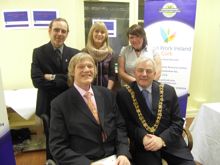2011 Press Releases
24.01.2011
Poverty and social exclusion are among the key elements which underpin many people’s problem drug use according to a report published at UCC. The impact that community based youthwork drug projects can and do have on drug issues is published in a report titled: “Youthwork as a Response to Drugs Issues in the Community” launched at the University by Mr Brian Crowley, MEP. The research was undertaken by Mr Pat Leahy, School of Applied Social Studies, UCC, along with two Bachelor of Social Work undergraduate students Ms Emma Bennet and Ms Aoife Farrell. The report was commissioned by Youth Work Ireland Cork.
Mr Pat Leahy said that the research into the work of Youth Work Ireland Cork (the organisation that operates the drugs project in Gurranabraher, Cork) shows the effectiveness of small, locally based harm reduction projects that feature dedicated and skilled workers in dealing with drug related issues. “Community-based drugs task force projects are having a significant effect on the lives of drug users who avail of these services”, he said.
Mr Leahy explained: “Community-based project workers proactively assist people in dealing with their issues at all levels, from the youngster who is starting to experiment with cider and cigarettes to the ‘hardened’ users who are prostituting to pay for their drugs. In Ireland, on the one hand we have tended to view drug use, especially illegal drug use, as a medical and or a legal matter. On the other hand, projects like the Youth Work Ireland Cork service view these issues as stemming from social issues and therefore needing a social response. From the School of Applied Social Science’s perspective this makes these projects very interesting; we train youth, social and community workers so understanding the methods and means of these drug workers allows us to pass this knowledge onto future professionals in these areas.”
The key findings of the study are:
- A social rather than medical or legal based response to drugs issues offers policy makers and practitioners a genuinely holistic methodology for effective intervention
- A local rather than universal response rooted in harm reduction allows for cultural, geographical and community factors to dictate the nature of an intervention
- Effective praxis in this field requires skilled, independent, reflexive, motivated and creative practitioners operating within a supportive agency setting
- A clear theoretical framework encompassing knowledge of young people, drugs work, human behaviour and communities is a fundamental prerequisite to best practice
- A high degree of service visibility in the community and easy access to the services is required
- Community based projects work effectively with service users who will never enter treatment; they offer drug users an effective alternative to medicalised responses
- In many cases inappropriate and problem drug use is a consequence of social inequality; interventions that can respond to these social issues in (particularly disadvantaged) communities offer the people who suffer from drugs issues a far more comprehensive range of services than a medicalised response.
- Human contact between the service user and the practitioner in the form of a relationship founded on trust is the key building block of success
- In terms of cost effectiveness community based projects offer excellent value for money; the overwhelming majority of funding is used in the provision of frontline services.

